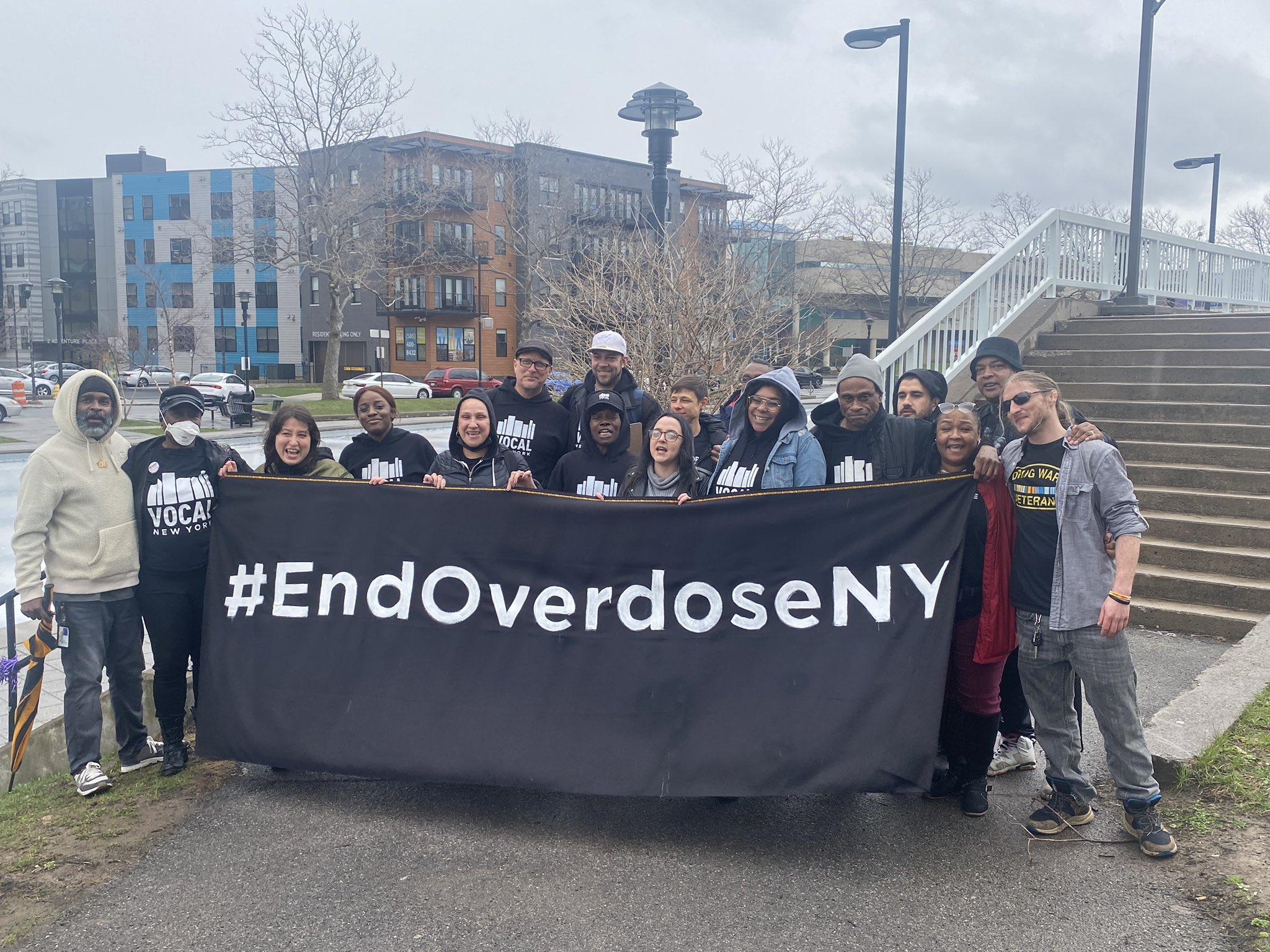On April 7, activists rallied across New York state to demand that politicians take straightforward steps toward ending the overdose crisis. A coalition including VOCAL-NY, New York Harm Reduction Educators, Washington Heights CORNER Project and Housing Works organized the actions, which took place in Rochester, the state capital Albany, and New York City. Their main goals are for the government to authorize safe consumption sites (SCS) statewide, and to stop arresting people for possessing buprenorphine.
The need is urgent. Like much of the United States, New York has suffered a harrowing rise in overdose deaths in the past decade—now largely driven by fentanyl-involved deaths. For years, former Governor Andrew Cuomo actively opposed measures proven to save lives, like authorizing SCS and expanding access to medications for opioid use disorder (MOUD). His successor, Gov. Kathy Hochul, has improved on his record, but she and other lawmakers are being urged to take much bolder action.
Thursday’s protests featured speeches from current and former drug users, who shared their personal experiences of overdose. Elected officials participated, too, like NYC Council Member Tiffany Cabán, Monroe County Legislator Rachel Barnhart and Rochester City Council member Kim Smith.
Marilyn Reyes @VOCALNewYork “Our communities are mourning!!!” pic.twitter.com/AdvRhl2kU9
— Lighthouse Learning Collective (@HRC_Lighthouse) April 7, 2022
Legal Protection for Safe Consumption Sites
The activists demanded that lawmakers pass the Safer Consumption Services Act (Senate Bill 603/Assembly Bill 224). This bill would allow health officials statewide to authorize community organizations to open an SCS—where people can use drugs with trained peers and staff and the overdose-reversal drug naloxone on hand.
New York City opened the nation’s first two authorized SCS in November 2021; in just the first thee months, staff averted 150 overdoses. And there’s more coming soon. During the rallies, Housing Works president Charles King announced that his organization will open two new SCS in the city, one in Midtown and another on the Lower East Side.
But no legislation was passed to allow this—it’s based only on a decision from former Mayor Bill de Blasio, weeks before he left office. And without formal legal protection, these sites could easily be attacked and even shut down. US Representative Nicole Malliotakis (R), representing part of Staten Island, has a bill in Congress that would ban any spending of federal funds on SCS.
“The importance is the services, and not judging but accepting them when they walk through those doors.”
“Our people are homeless and have nowhere to use,” Ivette Chavez Gonzalez, a peer outreach worker with VOCAL-NY,” told Filter. “That’s why we’re finding people in abandoned buildings because they have nowhere to go and no one to meet them where they’re at … If we got one of these [SCS], the importance is the services, and not judging but accepting them when they walk through those doors.”
Chavez Gonzalez explained that SCS are simple and inexpensive to open—the only real barrier is political ignorance.
“We will find a building anywhere,” she promised. “You can just make a building and the health department will help support you—it’s very easy to put together, I think.”
“The problem is, the legislators don’t want to come on board.”
Buprenorphine Decriminalization
The activists also called for lawmakers to decriminalize buprenorphine. The medication for opioid use disorder (MOUD), best known by the brand-name Suboxone (a buprenorphine and naloxone formulation) is available by prescription. It is considered (along with methadone) the “gold standard” for OUD treatment. Despite this, it remains badly misunderstood. New York prisons have denied it to incarcerated people in need; lawmakers recently ended this form of medical negligence.
The requirement of a doctor’s prescription is already a barrier for low-income and uninsured patients. But complex federal rules make burprenorphine harder to prescribe than other medications, like Prozac or Xanax. This fuels an illicit market of “diverted Subs”, where people sell their prescription buprenorphine to other opioid users. This practice can be regarded as a form of harm reduction, yet people face arrest and jail time if caught by police.
Senate Bill 2524/Assembly Bill 612 would decriminalize buprenorphine, removing it from the list of controlled substances.
“Decriminalization would help me take my medicine as prescribed.”
Chavez Gonzalez herself is prescribed Suboxone. She explained that she has to carry her doses in a special box marked with her full name and prescription, as a form of protection against cops accusing her of illegal possession.
Asked how often this happens, she said, “Every day. People come out of the agency and get arrested with Suboxone … Half of my charges are for carrying Suboxone, when the doctor gave it to me.”
“Decriminalization would help me take my medicine as prescribed,” she added, “and wake up the next morning and maybe get a job, maybe not be homeless, take care of my business, do whatever I need to do.”
Photograph of activists in downtown Rochester, NY on April 7, shared by Sarah Clark via Twitter.





Show Comments